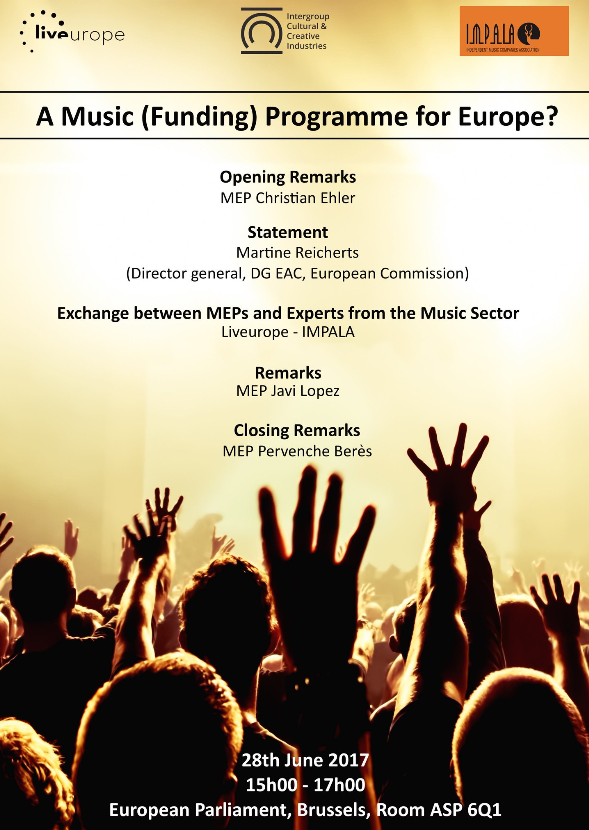Mercredi 28 juin 2017
Communiqué de presse – Intergroupe Industries culturelles et créatives

Le secteur de la musique génère des revenus de plus de 25 milliards d’euros par an et emploie plus de personnes que l’industrie cinématographique. Ces dernières années, les changements technologiques ont entraîné des changements radicaux dans l’industrie de la musique. La numérisation et la distribution en ligne ont modifié les flux de revenus, les modèles commerciaux ont été remodelés et de nouveaux modèles de consommation sont apparus. Alors que la musique est plus que jamais consommée, les artistes et les producteurs ne reçoivent pas de rémunération équitable pour l’exploitation en ligne de leur travail. La visibilité des contenus européens sur les grandes plateformes de diffusion n’est, et de loin, pas équivalente à celles des artistes américains et britanniques. De plus, la musique a toujours été le parent pauvre de la politique culturelle européenne, plus tournée vers le cinéma — 25 ans de programme Media — et le livre.
C’est pourquoi je soutiens la création d’un programme spécifique pour la musique et la mise en place une véritable stratégie, pour épauler des projets qui ont comme ambition de construire des ponts entre pays d’Europe afin de créer un marché européen pour le répertoire européen plus grand que le marché anglo-saxon.
Ci-dessous le communiqué de presse qui a suivi la réunion de popularisation de ce beau projet au Parlement européen,dans le cadre de l’intergroupe « Industries créatives et culturelles », que je co-préside avec mon homologue Christian Ehler.
EP Creative Industries Intergroup supports the creation of a European funding programme for the music sector
Representing 1,2 million jobs, the European music industry is growing at a fast pace and holds untapped potential that can be optimized through a tailor-made funding programme at EU level.
In the context of the Music Moves Europe initiative, since late 2015, the European Commission has held intense discussion on the challenges of the sector, with various representatives of the music ecosystem.
This June 28, the European Parliament seized the opportunity to discuss the identified needs for a developed support to the European music sector, during an event organized by the European Parliament’s Creative Industries Intergroup.
A momentum to inject positive messages into the EU rationale
MEP Christian Ehler opened the event underlining the joint effort by the EU Institutions to elaborate a Preparatory Action and outlining the directions it could take. ‘This is the right time to push music forward for the new generations’ he stated.
‘We need to acknowledge the real concerns of EU citizens. Music can be a part of the agenda to address economic and societal changes in Europe’, added Martine Reicherts, Director General of DG EAC at the European Commission.
‘Because music brings people together, these kind of initiatives could provide a more friendly view of EU institutions’ continued MEP Javi Lopez. ‘Music is interested in Europe, but Europe should be even more interested in music.’
Paving the way for a funding programme for the music sector by 2021
‘The music sector is the canary in the coal mine. It was the first to be impacted by the digital shift but also the first one to adapt’ recalled Matthieu Philibert of IMPALA, the independent music companies association. ‘Right now the music sector is under financed and a dedicated support would give the industry a welcome boost’.
‘The Preparatory Action currently discussed in the CULT Committee is a great test before moving to a larger programme’ underlined Fabien Miclet of Liveurope, a EU-funded platform for live music venues. ‘This pilot phase can give us the means to map the European music sector as a whole and evaluate our impact on the entire continent’.
MEP Bogdan Wenta, who tabled the Preparatory Action asserted: ‘we can be very proud of the work we’ve achieved so far as such an initiative could benefit to music stakeholders across the spectrum’.
‘This is not only about the symbol, it’s a strategy that we can impulse altogether’ concluded MEP Pervenche Berès. ‘In just a few days, the CULT Committee will vote on the preparatory action, but the vote in the BUDG committee in September is the real stake here.’
